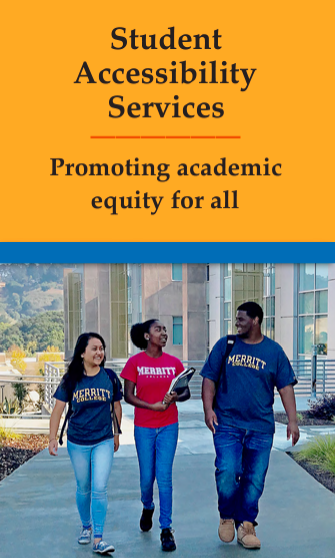This category includes all other verifiable disabilities and health related limitations that adversely affect educational performance. Some other disabilities are: Attention Deficit Disorder/Attention Deficit Hyperactivity Disorder
(ADD/ADHD)
Definition:
Attention Deficit Disorder/Attention Deficit Hyperactivity Disorder (ADD/ADHD) is a chronic neurological condition characterized by problems with attention, focusing and persistence and often, but not always, hyperactivity. ADD/ADHD must be diagnosed by a medical doctor, psychiatrist or licensed psychologist and sometimes medication is prescribed.
Characteristics:
Students with ADD/ADHD may exhibit one or more of the following characteristics:
Classroom Skills:
• Difficulty paying attention when spoken to; inconsistent concentration.
• Difficulty listening to a lecture and taking notes at the same time.
• Easily distracted by background noise or visual stimulation, may appear to be hurried in one-to-one meetings.
• Difficulty memorizing basic facts.
Study Skills:
• Difficulty reading or comprehending word problems.
• Compositions lack organization and development of ideas.
• Trouble sustaining attention. Restless, fidgety. Lacks attention to details.
• Forgets things, loses or leaves positions. Difficulty following instructions.
• Impatient and easily frustrated. For many students the harder they try the worse their symptoms become.
Social Skills:
• Easily overwhelmed by tasks of daily living. Poor organization and time management.
• Difficulty completing projects. Inconsistent work performance.
• Trouble maintaining an organized work area.
• Makes decisions impulsively. Difficulty delaying gratification, stimulation seeking.
• Makes comments without considering their impact.
Many of the suggestions for students with Learning Disabilities are applicable to students with ADD/ADHD.
Possible Accommodations:
• Academic support
Alternative testing (extended time, reader, scribe, distraction reduced setting, and/or computer)
• DSP courses (Study Skills/Computer Access Lab)
Note-taking assistance
• Textbooks on tape
Cardiac Disorders:
Additional considerations are generally not needed for students with cardiac disorders except when the course requirements involve an unusual amount of physical activity or if medical complications arise that cause them to miss class.
Chemical Dependency:
These are students who are in recovery and have been verified as having a chemical dependency on drugs or alcohol.
Diabetes:
Students with diabetes generally require no classroom accommodations. Occasionally they may need to snack during class. Students generally schedule time to eat before strenuous physical activity. Problems such as diabetic coma and insulin shock may occur when there is an imbalance of insulin, food, and energy expenditure. If these problems arise, please call 911.
If a student seems dazed, confused, or is unresponsive, please call the Campus Police emergency number, (510) 466-7236 or 911 to assist the student. These may be a sign of diabetic shock.
Multiple Sclerosis and Muscular Dystrophy:
Although these symptoms are sometimes invisible they may affect the student in a multitude of ways. The symptoms have a tendency to come and go, but they continue to progress. Understanding the fluctuations that may occur in the student’s behavior makes it easier to understand variations in classroom performance.
Short of Stature:
Students of short stature will have in-classroom access problems similar to those of a student in a wheelchair.
Speech Impairments:
Impairments range from problems with articulation or voice strength to being totally non-vocal. They include stuttering (repetition, blocks, and/or prolongations occasionally accompanied by distorted movements and facial expressions) chronic hoarseness (dysphonia), difficulty in evoking an appropriate word or term (nominal aphasia), and esophageal speech (resulting from a laryngectomy). Many students with speech impairments will be hesitant about participating in activities that require speaking.
To arrange for an appointment with a DSP Counselor:
Download the Disability Verification Form.
• Fill it out.
• Call 510-436-2429 or drop by R-109 to make an appointment.
• Bring completed form(s) to your appointment.
• Bring supporting documentation on disabilities to your appointment.
Downloads:




